BEEMAN’S BLOG – SEASON 2, EPISODE 11
"POWERLESS"
WARNING SPOILERS ARE CONTAINED WITHIN
Sorry for getting the blog up a little late this week.
Sadly, here at the HEROES offices we’ve dropped below a skeleton crew to a nobody crew, and I got stuck doing all the computer uploading, research and spell/fact checking alone. If there are more mispellings and fact mistakes than usual, forgive me!
So… Tonight our eleventh episode aired. It was written by Jeph Loeb and directed by Allan Arkush, both of who did their usual outstanding job! And I hope you all agree it is a fitting end to this segment of the season.
This time I thought I would do something a little different. I’ve been meaning to interview our composers Wendy Melovin and Lisa Coleman since way back since last season. I’ve actually tried to do it several times, but our schedules have been notoriously out of sync with each other. Now we finally hooked up.
The music of HEROES is I think, one of its most important elements. It is moody and ethereal and both unsettling and uplifting all at once. The instrumentation and orchestration are highly unusual. There’s also a lot of it. Two or three weeks before the show is on the air, we have a spotting session, where the producers Wendy and Lisa go through the picture and specify where we want music and what emotional effect we want out of the music. At the end of those sessions we always joke, saying, “well, this time there were only five music cues. All of act one. All of act two. All of act 3. All of Act 4 and all of act 5." By the way, that’s A LOT. Thirty to thirty five minutes of a forty-two minute show. I’d guess that’s maybe double an average TV show. And Wendy and Lisa will then have, frequently, less than a week to compose and record all of it.
I met them in their studio which is a unique and funky place in Hollywood, they call the “tree house” It’s a low ceilinged space, up a winding flight of steps, that is both cozy and crammed with so many instruments, mixing boards and hard drives that you can hardly believe it fits. They gave me a cup of coffee and we got started...
GREG BEEMAN: So, first of all, how long have you two known each other.
WENDY: Oh. Since we were two.
GB: Really? You’re kidding?
LISA: Our Dad’s were both studio musicians in Los Angeles. They knew each other and played together. They actually were in this same building for many years.
W: The A & M building. Our first band together was when we were 7. It was called “The Waldorf Salad”
L: Which isn’t a name we picked. Our parents picked because at that time we all went to a Waldorf School, Highland Hall, here in L.A.
W: The first real band we had – the first time we made money we were about 11 with my brother and sister.
GB: Cool. I’m so sorry I’m no naïve. Is this all common knowledge?
W: For Wendy and Lisa fans, yeah. But not to the general public.
GB: Okay great. And so, when did you hook up with Prince?
L: I joined Prince’s band in ’78 or ’79. He was looking for a female keyboard player. A friend of mine brought him to see me and I ended up joining his band.
GB: And you went to Minnesota?
L: Yes, where it is SO cold.
GB: How about Wendy?
L: She was visiting me in Minneapolis, and there was a sound check.
W: There was another musician who, well, lets say, was having a bad day and didn’t show up for sound check.
L: I suggested that Wendy play for the sound check, and so she sound checked with the band and she just shredded it. Prince was blown away.
GB: And the rest was history.
W: The rest was history.
GB: Okay, so how and when did the transition to music for movies and television happen.
W: Always. We always had an interest in it. It just seemed natural. Lisa father was an experimental musician, who worked on many films and art projects.
L: And Wendy’s father was a top piano player who played on many soundtracks, especially with Jerry Goldsmith as well as other composers.
W: It was a natural progression. Even before Prince, we always wanted to do music for film. We used to listen to records of soundtracks and read the score.
L: I was a total geek. Not cool at all. It was always a culture shock for me to be in the pop world.
GB: So what was the path that led to doing your own scores?
W: A movie called TOYS was our first opportunity. We did a title sequence for Hans Zimmer. And then Trevor Horn. And then Mark Isham, and he handed a movie over to us, which was the movie DANGEROUS MINDS with Michelle Phieffer, our big break.
L: Which, of course, mostly led to us doing a lot of low budget urban movies.
W: We started doing a lot of bad movies. Bad TV pilots.
L: Some were good. Some you don’t even want to mention.
W: And then we met Allan Arkush.
GB: That was a big turning point?
W: That was everything. That changed everything.
GB: What happened.
L: He called us up. He knew our work and he wanted to meet us. He was doing a David Kelley TV show called “SNOOPS” and he said they wanted it to be a little more rock and roll, a little offbeat.
W: We heard what it was about, and we were like, “I don’t know.” We weren’t sure we were interested.
L: But we went to Allan’s office to meet him. And Allan knows EVERYTHING about music. Everything about our Dads. Everything. More than we ever knew.
W: And there on his wall was a picture, of my brother, who had died a few years before. Allan had directed a movie called GET CRAZY, and my brother had worked on it. And there was this picture of Allan and my brother, who had passed away, and Allan didn’t even know it, but right then we knew, “this is fate.”
L: And we’ve done everything with Allan ever since then.
W: 150 hours of music later. And it has changed everything.
GB: And it all led to HEROES…
W: And HEROES changed everything again.
GB: Why?
W: Because it’s a true artistic endeavor. Every week. A lot of times with music for television, what your asked to do, it’s like bad porn.
GB: What does that mean?
W: You have almost no screen time to make any statement, to build any character. You don’t own any of the black, meaning the time when the act ends and it goes to black for a few seconds before commercial, and so you’re supposed to just jam home whatever the main emotion it is they’re going for. Nothing is contrapuntal. Nothing is subtle.
L: It’s so uninspired and uninspiring. With most TV it’s a job, a craft, not an art. You have short scenes and the music cues are so short. And network executives get scared whenever you DO experiment, so it’s frustrating.
GB: For instance?
W: Well, a small example, on CROSSING JORDAN, which was a good show and good musically, but originally Jordan’s character was supposed to be Irish. So we tended to play this up with a lot of Irish instruments and instrumentation. And sure enough the note comes down, “Can we back off the Irish stuff a bit.”
L: TV in general wants to hit every demographic, to appeal to the broadest audience possible. So, in doing that, the music tends to become generic. You can’t be hot or cold, you have to be lukewarm. If it’s funny, it’s a rim shot. If it’s sad it’s strings. If it’s exciting, it’s drums, and so on.
W: When it came to HEROES, We had done one cue for the pilot that was very dreamy. And another, exciting cue for an action scene. And Tim Kring came in to see what we were doing, and he said “Hey, let’s try the dreamy cue under the action scene.” And that became the cue under for Claire, when the trains on fire. Which has become a signature piece of music for the show.
L: And that was huge. When Tim said, “Let’s play the dreamy cue under the action scene,” it changed everything. It focused our minds on what this show could be and how it could be different.
GB: Did Tim talk a lot about what he wanted the music to be at the pilot stage?
W: He talked in a general way. He talked about the emotions and the directions of the characters. He gave us the idea he wanted to be incredibly unusual musically. And he definitely gave us the idea that we could have a lot of freedom and that we could really experiment.
L: He talked a lot about about subtext also. In HEROES every scene has MASSIVE subtext. The music is making the viewer unconsciously listen in a way that makes them believe there is more going on than what you see.
W: We have to work the same way you and Allan direct. We ask ourselves, “How are we going to tell this story and get from point “a” to point “b” emotionally?” What was Allan telling us, that in this 11th episode he had a scene in the vault that was two pages, but that it was so dense, it took 65 setups to tell the story? Well, that’s how the music is too. There are A LOT of layers, there’s A LOT going on in the music.
L: For instance, in the scenes between HRG and Claire, on the surface you may have a scene where the father is taking the daughter to school. On the surface it’s mundane. But there are layers and layers in that relationship. Layers of deceit. Layers of lies. Layers of mistrust. Layers of loyalty. And, also, always, and very strongly, layers of love. Well, all those things have to be told musically.
W: We do it the same way you guys shoot it. When you do a big swooping crane in, we have to support it. And... What’s that lens that you always use? The one Allan used so much in this episode, so that HRG’s glasses are in focus at the same time Bob is in focus.
GB: The swing and tilt lenses?
W: Yeah. Well, we have to do that too. We have to tell two or more very different stories, at the same time with the music.
L: Themes of intention. Themes of subtext. Themes of implication.
GB: That’s interesting, because I find in my own work, these days, and now that I’ve matured and hopefully gotten better, that I do A LOT of very complicated things with the camera and the blocking, all to support the emotion of a scene. But, when it’s all put together, it’s all very subtle. It isn’t really noticed. I experience the music on this show the same way. It affects you, and it moves you, actually very strongly, spiritually really... but you don’t notice it doing so. Maybe your work is like mine, it’s best when it’s not calling attention to itself.
W: If you study it, it’s much more complex than it seems. On the surface, much of the time it’s pastoral. But if you break it down, if, for instance, every piece of music was a color, if you broke it down and looked at it, you couldn’t tell what color was the main one, there are so many.
GB: Well the music works, everyone loves it. I actually don’t think you ever get network notes. Do you?
W: No. Allen and you give notes in the spotting session. Tim always has notes. There are notes from Tim and Dennis and Allan at the playback, and we still shift cues around. But, no, I think this is the first time in fifteen years that we really don’t get any network notes.
GB: Whose actually playing? Do you bring in musicians?
W: Just the two of us play everything.
L: It’s where the classical training comes in. We can play everything. And we’ve been building, and spending a lot of money of building up our music and sound effects library for this show.
(At this point I look around. Damn. There are a lot of hard drives here.)
W: We have 3 huge Intel Macs, we have a hard raid system, and we have so much information.
L: We need a lot. There are 30 to 35 minutes of music per show, which is unheard of in TV.
W: And we do not re-use music. I know it seems like we can or should. But when you get into these scenes, you can’t. There is always some new element or layer that makes it not possible to re-use an old cue.
L: We have our legends. What music goes with what character?
GB: What are some examples.
L: Mohinder gets a signature piano sound, which is now used at the end of the show.
W: There are actually four completely different pianos that we use in the show.
L: Mohinder's is a Bulgarian piano. We play it super compressed, like it’s coming out of a faraway radio – that’s because he’s so analytical, he’s always trying to figure it out, trying to dial it in.
W: Peter is marcato strings.
GB: What’s “marcato?”
W: It’s just an instruction to the musician of how to play the instrument. Marcato indicates to make quick, strong jabs with the bow. It felt right to play his character that way, like, “I’m going to be a hero now.”
L: Hiro is always marimbas and bassoons, always staccato to emulate a clock, like time, controlling time.
GB: I also hear a lot of, what sounds like wind, like controlled noise, wind moving through pipes.
W: We do a lot of wind, it’s true.
GB: It adds tension.
L: We have a lot of different wind. We used to do a really cool thing with the character of Claude, which was wind mixed with voices. It felt like there was a ghost in the room. There are also a lot of drones and chants that we mix into a lot of the music. This is because Mohinder, the narrator, is Indian.
W: Whenever Niki is being possessed by Jessica, there’s a piece we use that uses Indian voices chanting, which gives the scene a feeling of her being possessed. There’s a possession when she’s in the middle of a violent act she’s not in control of. So we use incantations to underscore this.
L: With Matt, when he's reading minds, we play voices, chanting voices, backwards, because it seems to us, that's his experience, he's drawing thoughts out of people's minds, so those thoughts would travel backwards.
GB: Wow. Which of your father’s was an experimental musician. It sounds like it’s served you well.
L: Mine was. And yes it has. Although now I call it, a “sound artist.”
GB: Okay, tell me about Shenkar. He gets his name in the credits next to your composer credit.
W: Well, he is probably most famous for being the vocalist in Peter Gabriel’s score for “The Last Temptation of Christ.” And also for “The Passion of the Christ.” And, as I said, Tim gave us the idea that we could do ANYTHING on this project. So we approached Shenkar and asked him if he’s like to be the guiding voice for the heroes on their quest. To me he IS the voice of HEROES. Years from now, whenever they parody the show on MAD TV or SATURDAY NIGHT LIVE or whatever, I’m sure they will parody him, because he is the voice of the show.
GB: What is his nationality?
W: He’s Indian. But he’s here in L.A. a lot. Here and there. He’s a very mysterious guy.
L: And he never lets you see him sing.
GB: Huh? How does that work?
L: I write down some instructions of what we’re looking for, and lay down three or four minutes of a drone in “D” and also in “E” and “A” and he literally comes in, in the middle of the night, when nobodies here and lays down his voice over the drone.
GB: That’s crazy.
W: That’s Shenkar. He's our mysterious little goblin.
L: We originally just wanted everything he did long and smooth and legato. Lately I’ve been wanting him to come in again and do some quicker pieces.
GB: Okay, last thing. Tell me about Allan Arkush who directed tonight’s episode
W: he is the most musical person I’ve ever worked with, even in the music business. He knows exactly what he wants.
L: His notes are SO specific. To the frame what he wants and to the instrumentation that he wants.
W: And he never forgets a note. If he says something at the spotting and weeks later at the playback, you didn’t do it. Allan remembers.
L: Allan is the best. We really are so connected to him now. It's a great relationship.
GB: Wow, That’s great. Thank you so much. Maybe now the fans will be able to listen more carefully to the amazingly deep music you guys write for this show.
And that’s it!
Fans, I wish I could tell you what's happenin g, but I truly do not know what the future holds. None of us in Hollywood knows when the strike will be over, or if when and how many more episodes of HEROES will happen this year.
But no matter what, we WILL be back, serving you to the best of our abilities, as soon as we can.
As for this blog – it will go dark now – until the show is back on the air. Thank you all for this opportunity. This blog is half like a term paper I have to write every week, and half an incredible opportunity to become more directly linked to you guys… Our fans who are our life’s blood. It's become a very special experience for me to put it out there for you every week.
Until we meet again…. PICTURES!!!
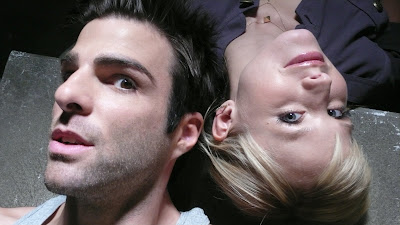
ZACH AND KRISTEN
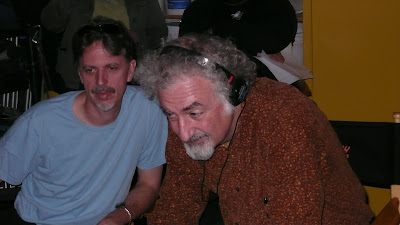
TIM KRING AND ALLEN ARKUSH ON SET
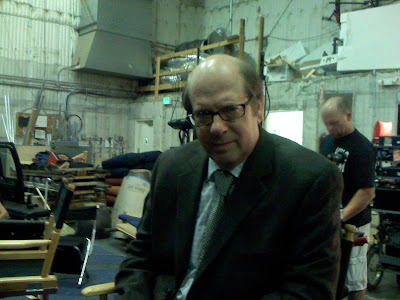
CALL ME "BOB"

OVER KRISTEN TO THE CREW AT WORK
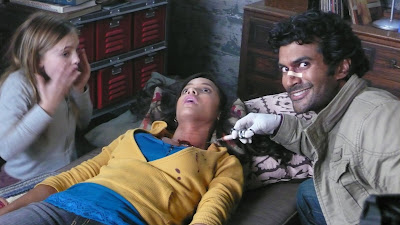
MOHINDER WONDERS "WHY DOES SYLAR GET ALL THE FUN?" MOLLY DESPAIRS!

DANIA AND KRISTEN
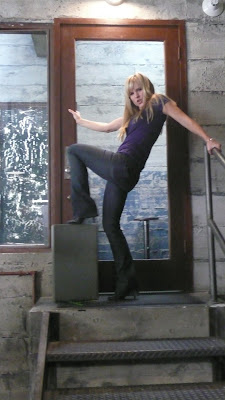
KRISTEN HOLDS UP A DOORWAY
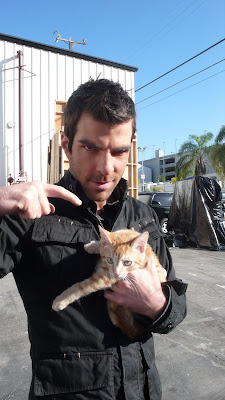
SYLAR WANTS PUDDY-TAT POWER!

MASI AND MILO ON SET
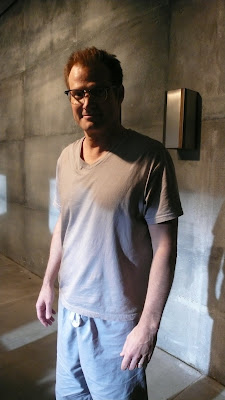
HRG IN HIS PAJAMAS -"WHAT'S FOR BREAKFAST?"
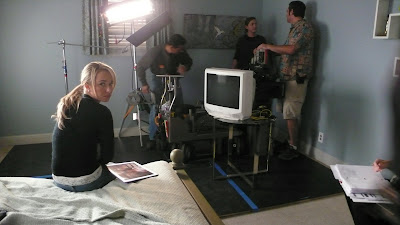
HAYDEN ANOTHER DAY AT WORK
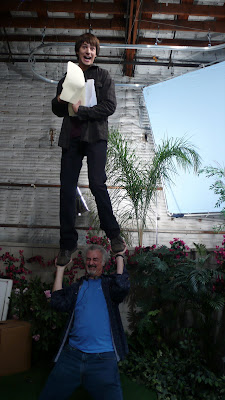
DIRECTOR SUPPORTS ACTOR

ALLEN AND JACK
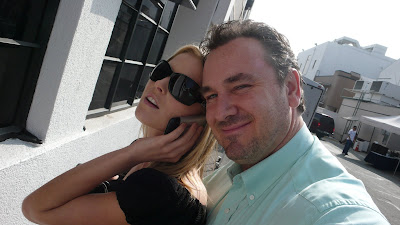
ME 'N ALI L.
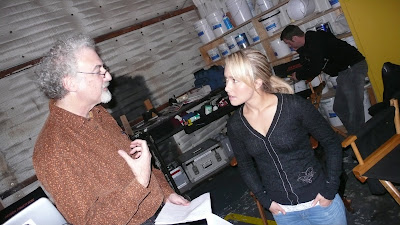
ALLEN DIRECTS HAYDEN ON SET
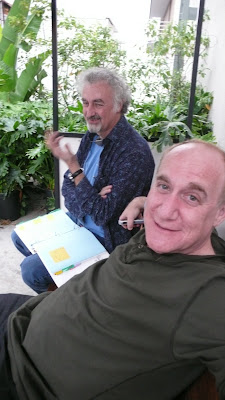
TWO GENIUSES (LOEB AND ARKUSH)
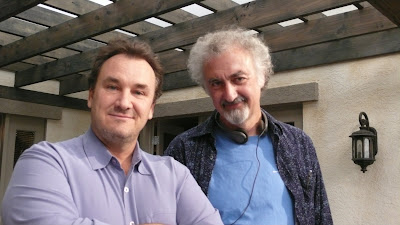
TWO MORE GENIUSES (ME AND ARKUSH)
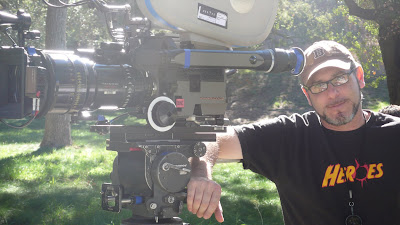
DIRECTOR OF PHOTOGRAPHY NATE GOODMAN

CHRISTINE ROSE - THE QUEEN
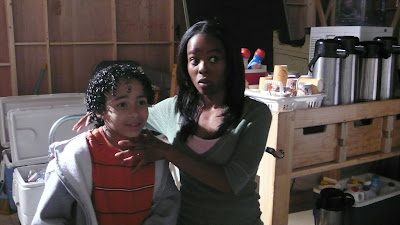
NOAH AND DANA ON SET
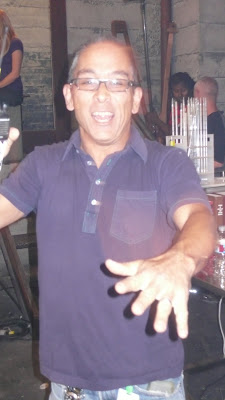
ACTUAL SHOT OF 1ST A.D. ROBERT SCOTT CHASING ME OFF SET (APPARENTLY ALL THE PICTURE TAKING SLOWS DOWN PRODUCTION?!?)
"POWERLESS"
WARNING SPOILERS ARE CONTAINED WITHIN
Sorry for getting the blog up a little late this week.
Sadly, here at the HEROES offices we’ve dropped below a skeleton crew to a nobody crew, and I got stuck doing all the computer uploading, research and spell/fact checking alone. If there are more mispellings and fact mistakes than usual, forgive me!
So… Tonight our eleventh episode aired. It was written by Jeph Loeb and directed by Allan Arkush, both of who did their usual outstanding job! And I hope you all agree it is a fitting end to this segment of the season.
This time I thought I would do something a little different. I’ve been meaning to interview our composers Wendy Melovin and Lisa Coleman since way back since last season. I’ve actually tried to do it several times, but our schedules have been notoriously out of sync with each other. Now we finally hooked up.
The music of HEROES is I think, one of its most important elements. It is moody and ethereal and both unsettling and uplifting all at once. The instrumentation and orchestration are highly unusual. There’s also a lot of it. Two or three weeks before the show is on the air, we have a spotting session, where the producers Wendy and Lisa go through the picture and specify where we want music and what emotional effect we want out of the music. At the end of those sessions we always joke, saying, “well, this time there were only five music cues. All of act one. All of act two. All of act 3. All of Act 4 and all of act 5." By the way, that’s A LOT. Thirty to thirty five minutes of a forty-two minute show. I’d guess that’s maybe double an average TV show. And Wendy and Lisa will then have, frequently, less than a week to compose and record all of it.
I met them in their studio which is a unique and funky place in Hollywood, they call the “tree house” It’s a low ceilinged space, up a winding flight of steps, that is both cozy and crammed with so many instruments, mixing boards and hard drives that you can hardly believe it fits. They gave me a cup of coffee and we got started...
GREG BEEMAN: So, first of all, how long have you two known each other.
WENDY: Oh. Since we were two.
GB: Really? You’re kidding?
LISA: Our Dad’s were both studio musicians in Los Angeles. They knew each other and played together. They actually were in this same building for many years.
W: The A & M building. Our first band together was when we were 7. It was called “The Waldorf Salad”
L: Which isn’t a name we picked. Our parents picked because at that time we all went to a Waldorf School, Highland Hall, here in L.A.
W: The first real band we had – the first time we made money we were about 11 with my brother and sister.
GB: Cool. I’m so sorry I’m no naïve. Is this all common knowledge?
W: For Wendy and Lisa fans, yeah. But not to the general public.
GB: Okay great. And so, when did you hook up with Prince?
L: I joined Prince’s band in ’78 or ’79. He was looking for a female keyboard player. A friend of mine brought him to see me and I ended up joining his band.
GB: And you went to Minnesota?
L: Yes, where it is SO cold.
GB: How about Wendy?
L: She was visiting me in Minneapolis, and there was a sound check.
W: There was another musician who, well, lets say, was having a bad day and didn’t show up for sound check.
L: I suggested that Wendy play for the sound check, and so she sound checked with the band and she just shredded it. Prince was blown away.
GB: And the rest was history.
W: The rest was history.
GB: Okay, so how and when did the transition to music for movies and television happen.
W: Always. We always had an interest in it. It just seemed natural. Lisa father was an experimental musician, who worked on many films and art projects.
L: And Wendy’s father was a top piano player who played on many soundtracks, especially with Jerry Goldsmith as well as other composers.
W: It was a natural progression. Even before Prince, we always wanted to do music for film. We used to listen to records of soundtracks and read the score.
L: I was a total geek. Not cool at all. It was always a culture shock for me to be in the pop world.
GB: So what was the path that led to doing your own scores?
W: A movie called TOYS was our first opportunity. We did a title sequence for Hans Zimmer. And then Trevor Horn. And then Mark Isham, and he handed a movie over to us, which was the movie DANGEROUS MINDS with Michelle Phieffer, our big break.
L: Which, of course, mostly led to us doing a lot of low budget urban movies.
W: We started doing a lot of bad movies. Bad TV pilots.
L: Some were good. Some you don’t even want to mention.
W: And then we met Allan Arkush.
GB: That was a big turning point?
W: That was everything. That changed everything.
GB: What happened.
L: He called us up. He knew our work and he wanted to meet us. He was doing a David Kelley TV show called “SNOOPS” and he said they wanted it to be a little more rock and roll, a little offbeat.
W: We heard what it was about, and we were like, “I don’t know.” We weren’t sure we were interested.
L: But we went to Allan’s office to meet him. And Allan knows EVERYTHING about music. Everything about our Dads. Everything. More than we ever knew.
W: And there on his wall was a picture, of my brother, who had died a few years before. Allan had directed a movie called GET CRAZY, and my brother had worked on it. And there was this picture of Allan and my brother, who had passed away, and Allan didn’t even know it, but right then we knew, “this is fate.”
L: And we’ve done everything with Allan ever since then.
W: 150 hours of music later. And it has changed everything.
GB: And it all led to HEROES…
W: And HEROES changed everything again.
GB: Why?
W: Because it’s a true artistic endeavor. Every week. A lot of times with music for television, what your asked to do, it’s like bad porn.
GB: What does that mean?
W: You have almost no screen time to make any statement, to build any character. You don’t own any of the black, meaning the time when the act ends and it goes to black for a few seconds before commercial, and so you’re supposed to just jam home whatever the main emotion it is they’re going for. Nothing is contrapuntal. Nothing is subtle.
L: It’s so uninspired and uninspiring. With most TV it’s a job, a craft, not an art. You have short scenes and the music cues are so short. And network executives get scared whenever you DO experiment, so it’s frustrating.
GB: For instance?
W: Well, a small example, on CROSSING JORDAN, which was a good show and good musically, but originally Jordan’s character was supposed to be Irish. So we tended to play this up with a lot of Irish instruments and instrumentation. And sure enough the note comes down, “Can we back off the Irish stuff a bit.”
L: TV in general wants to hit every demographic, to appeal to the broadest audience possible. So, in doing that, the music tends to become generic. You can’t be hot or cold, you have to be lukewarm. If it’s funny, it’s a rim shot. If it’s sad it’s strings. If it’s exciting, it’s drums, and so on.
W: When it came to HEROES, We had done one cue for the pilot that was very dreamy. And another, exciting cue for an action scene. And Tim Kring came in to see what we were doing, and he said “Hey, let’s try the dreamy cue under the action scene.” And that became the cue under for Claire, when the trains on fire. Which has become a signature piece of music for the show.
L: And that was huge. When Tim said, “Let’s play the dreamy cue under the action scene,” it changed everything. It focused our minds on what this show could be and how it could be different.
GB: Did Tim talk a lot about what he wanted the music to be at the pilot stage?
W: He talked in a general way. He talked about the emotions and the directions of the characters. He gave us the idea he wanted to be incredibly unusual musically. And he definitely gave us the idea that we could have a lot of freedom and that we could really experiment.
L: He talked a lot about about subtext also. In HEROES every scene has MASSIVE subtext. The music is making the viewer unconsciously listen in a way that makes them believe there is more going on than what you see.
W: We have to work the same way you and Allan direct. We ask ourselves, “How are we going to tell this story and get from point “a” to point “b” emotionally?” What was Allan telling us, that in this 11th episode he had a scene in the vault that was two pages, but that it was so dense, it took 65 setups to tell the story? Well, that’s how the music is too. There are A LOT of layers, there’s A LOT going on in the music.
L: For instance, in the scenes between HRG and Claire, on the surface you may have a scene where the father is taking the daughter to school. On the surface it’s mundane. But there are layers and layers in that relationship. Layers of deceit. Layers of lies. Layers of mistrust. Layers of loyalty. And, also, always, and very strongly, layers of love. Well, all those things have to be told musically.
W: We do it the same way you guys shoot it. When you do a big swooping crane in, we have to support it. And... What’s that lens that you always use? The one Allan used so much in this episode, so that HRG’s glasses are in focus at the same time Bob is in focus.
GB: The swing and tilt lenses?
W: Yeah. Well, we have to do that too. We have to tell two or more very different stories, at the same time with the music.
L: Themes of intention. Themes of subtext. Themes of implication.
GB: That’s interesting, because I find in my own work, these days, and now that I’ve matured and hopefully gotten better, that I do A LOT of very complicated things with the camera and the blocking, all to support the emotion of a scene. But, when it’s all put together, it’s all very subtle. It isn’t really noticed. I experience the music on this show the same way. It affects you, and it moves you, actually very strongly, spiritually really... but you don’t notice it doing so. Maybe your work is like mine, it’s best when it’s not calling attention to itself.
W: If you study it, it’s much more complex than it seems. On the surface, much of the time it’s pastoral. But if you break it down, if, for instance, every piece of music was a color, if you broke it down and looked at it, you couldn’t tell what color was the main one, there are so many.
GB: Well the music works, everyone loves it. I actually don’t think you ever get network notes. Do you?
W: No. Allen and you give notes in the spotting session. Tim always has notes. There are notes from Tim and Dennis and Allan at the playback, and we still shift cues around. But, no, I think this is the first time in fifteen years that we really don’t get any network notes.
GB: Whose actually playing? Do you bring in musicians?
W: Just the two of us play everything.
L: It’s where the classical training comes in. We can play everything. And we’ve been building, and spending a lot of money of building up our music and sound effects library for this show.
(At this point I look around. Damn. There are a lot of hard drives here.)
W: We have 3 huge Intel Macs, we have a hard raid system, and we have so much information.
L: We need a lot. There are 30 to 35 minutes of music per show, which is unheard of in TV.
W: And we do not re-use music. I know it seems like we can or should. But when you get into these scenes, you can’t. There is always some new element or layer that makes it not possible to re-use an old cue.
L: We have our legends. What music goes with what character?
GB: What are some examples.
L: Mohinder gets a signature piano sound, which is now used at the end of the show.
W: There are actually four completely different pianos that we use in the show.
L: Mohinder's is a Bulgarian piano. We play it super compressed, like it’s coming out of a faraway radio – that’s because he’s so analytical, he’s always trying to figure it out, trying to dial it in.
W: Peter is marcato strings.
GB: What’s “marcato?”
W: It’s just an instruction to the musician of how to play the instrument. Marcato indicates to make quick, strong jabs with the bow. It felt right to play his character that way, like, “I’m going to be a hero now.”
L: Hiro is always marimbas and bassoons, always staccato to emulate a clock, like time, controlling time.
GB: I also hear a lot of, what sounds like wind, like controlled noise, wind moving through pipes.
W: We do a lot of wind, it’s true.
GB: It adds tension.
L: We have a lot of different wind. We used to do a really cool thing with the character of Claude, which was wind mixed with voices. It felt like there was a ghost in the room. There are also a lot of drones and chants that we mix into a lot of the music. This is because Mohinder, the narrator, is Indian.
W: Whenever Niki is being possessed by Jessica, there’s a piece we use that uses Indian voices chanting, which gives the scene a feeling of her being possessed. There’s a possession when she’s in the middle of a violent act she’s not in control of. So we use incantations to underscore this.
L: With Matt, when he's reading minds, we play voices, chanting voices, backwards, because it seems to us, that's his experience, he's drawing thoughts out of people's minds, so those thoughts would travel backwards.
GB: Wow. Which of your father’s was an experimental musician. It sounds like it’s served you well.
L: Mine was. And yes it has. Although now I call it, a “sound artist.”
GB: Okay, tell me about Shenkar. He gets his name in the credits next to your composer credit.
W: Well, he is probably most famous for being the vocalist in Peter Gabriel’s score for “The Last Temptation of Christ.” And also for “The Passion of the Christ.” And, as I said, Tim gave us the idea that we could do ANYTHING on this project. So we approached Shenkar and asked him if he’s like to be the guiding voice for the heroes on their quest. To me he IS the voice of HEROES. Years from now, whenever they parody the show on MAD TV or SATURDAY NIGHT LIVE or whatever, I’m sure they will parody him, because he is the voice of the show.
GB: What is his nationality?
W: He’s Indian. But he’s here in L.A. a lot. Here and there. He’s a very mysterious guy.
L: And he never lets you see him sing.
GB: Huh? How does that work?
L: I write down some instructions of what we’re looking for, and lay down three or four minutes of a drone in “D” and also in “E” and “A” and he literally comes in, in the middle of the night, when nobodies here and lays down his voice over the drone.
GB: That’s crazy.
W: That’s Shenkar. He's our mysterious little goblin.
L: We originally just wanted everything he did long and smooth and legato. Lately I’ve been wanting him to come in again and do some quicker pieces.
GB: Okay, last thing. Tell me about Allan Arkush who directed tonight’s episode
W: he is the most musical person I’ve ever worked with, even in the music business. He knows exactly what he wants.
L: His notes are SO specific. To the frame what he wants and to the instrumentation that he wants.
W: And he never forgets a note. If he says something at the spotting and weeks later at the playback, you didn’t do it. Allan remembers.
L: Allan is the best. We really are so connected to him now. It's a great relationship.
GB: Wow, That’s great. Thank you so much. Maybe now the fans will be able to listen more carefully to the amazingly deep music you guys write for this show.
And that’s it!
Fans, I wish I could tell you what's happenin g, but I truly do not know what the future holds. None of us in Hollywood knows when the strike will be over, or if when and how many more episodes of HEROES will happen this year.
But no matter what, we WILL be back, serving you to the best of our abilities, as soon as we can.
As for this blog – it will go dark now – until the show is back on the air. Thank you all for this opportunity. This blog is half like a term paper I have to write every week, and half an incredible opportunity to become more directly linked to you guys… Our fans who are our life’s blood. It's become a very special experience for me to put it out there for you every week.
Until we meet again…. PICTURES!!!
ZACH AND KRISTEN
TIM KRING AND ALLEN ARKUSH ON SET

CALL ME "BOB"
OVER KRISTEN TO THE CREW AT WORK
MOHINDER WONDERS "WHY DOES SYLAR GET ALL THE FUN?" MOLLY DESPAIRS!
DANIA AND KRISTEN
KRISTEN HOLDS UP A DOORWAY
SYLAR WANTS PUDDY-TAT POWER!
MASI AND MILO ON SET
HRG IN HIS PAJAMAS -"WHAT'S FOR BREAKFAST?"
HAYDEN ANOTHER DAY AT WORK
DIRECTOR SUPPORTS ACTOR
ALLEN AND JACK
ME 'N ALI L.
ALLEN DIRECTS HAYDEN ON SET
TWO GENIUSES (LOEB AND ARKUSH)
TWO MORE GENIUSES (ME AND ARKUSH)
DIRECTOR OF PHOTOGRAPHY NATE GOODMAN
CHRISTINE ROSE - THE QUEEN
NOAH AND DANA ON SET
ACTUAL SHOT OF 1ST A.D. ROBERT SCOTT CHASING ME OFF SET (APPARENTLY ALL THE PICTURE TAKING SLOWS DOWN PRODUCTION?!?)
Comments